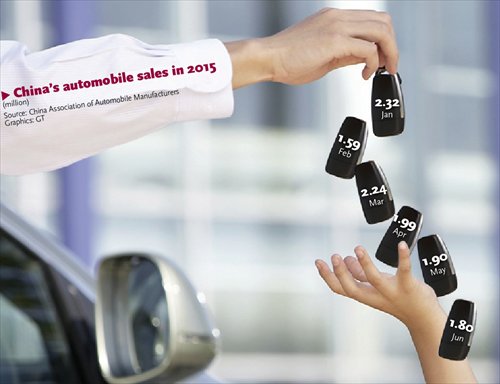
Analysts say it's time for change in industry's business model
Car dealers are facing a difficult time amid China's cooling economy, the Global Times found as it investigated domestic media reports that many dealers are on the verge of closing.
Over the weekend, the Beijing-based Economic Observer newspaper cited industry insiders as saying that a "tidal wave" of dealer closures is looming.
Although the report may have exaggerated the industry's predicament, Global Times reporters did find that many dealers face tough prospects.
One such dealer may be Lentuo International Inc, the car retailer that conducted a U.S. IPO in December 2010. It faced operating problems this year after having cash flow difficulties.
Lentuo runs eight dealerships in Beijing offering several major brands, and its car sales business has been suspended, the Economic Observer report said.
"Failing dealers may face capital shortages or decreasing revenue from their after-sales service," a sales consultant at a FAW-Volkswagen dealership in Beijing told the Global Times Tuesday on condition of anonymity.
The person said that slack sales are forcing car producers and dealers to boost flagging sales with financing offers and discounts.
A manager at an outlet of German premium car brand Audi told the Global Times Tuesday, also on condition of anonymity, that "in this market, it's everyone for himself."
A sales consultant at a BMW outlet in Chengdu, capital of Southwest China's Sichuan Province, who declined to be identified, told the Global Times that "the luxury car market is affected by an overall economic slowdown and a plunge in the stock market and sales are flat in this traditionally slack season, but there are no dealership closures in Chengdu."
"The situation of China's car dealerships is worrisome but there are not yet massive closures at the national level. In some regions, for instance, Central China's Henan Province, we have noted many closures, mainly among small or medium-sized dealerships," Wang Ji, deputy secretary-general of the China Auto Dealers Chamber of Commerce, a national chamber of more than 5,000 members, told the Global Times Tuesday.
Wang said the latest round of turmoil for dealerships began in 2014.
The 1.4 percent year-on-year sales rise in the world's biggest car market in the first half of this year was the weakest since at least 2009, according to a July 10 Reuters report that reviewed figures from the China Association of Automobile Manufacturers.
Experts said the decline reflected a variety of factors, including license caps in big cities and dwindling purchasing power.
"Car purchases using public money account for a large portion of sales, especially in the second-, third-, and fourth-tier cities. Consumers in this category are sticking to their old cars instead of buying new ones," an industry insider in Daqing, an oil-producing city in Northeast China's Heilongjiang Province, told the Global Times Tuesday on condition of anonymity.
Skyrocketing sales in recent years were driven by first-time buyers, the person said, but now growth in bigger cities relies on "shrewd and picky" consumers buying their second cars.
"Car makers allocate an agreed number of cars on a monthly basis to dealerships, which borrow from banks to obtain working capital, using the cars as collateral," a person who has two decades of experience in the dealership business told the Global Times on condition of anonymity.
When sales fall, dealers' inventories rise and put pressure on their cash flow, the person said.
More than 80 percent of the dealerships are privately owned, which means they have a hard time borrowing cheaply from banks, Wang said.
"Car makers and dealerships have a co-dependent relationship, but the producer controls this relationship. Each year, producers set higher sales targets as their output expands, and dealers struggle as a result," the dealership veteran said.
"Compared with a few years ago, now there are fewer people wishing to invest and set up a dealership. With demand cooling, the industry needs to find a new equilibrium," the dealership veteran said.
If nothing changes, there could be a crisis, Wang said. "But if it gets the right fix, then the majority of dealers will survive, as we believe the Chinese mainland auto market is still not fully saturated."
Some brands are reviewing or reducing their 2015 sales targets to give dealers some relief, according to media reports. But there are also brands reportedly saying they will not cut their production targets for the year.


















































